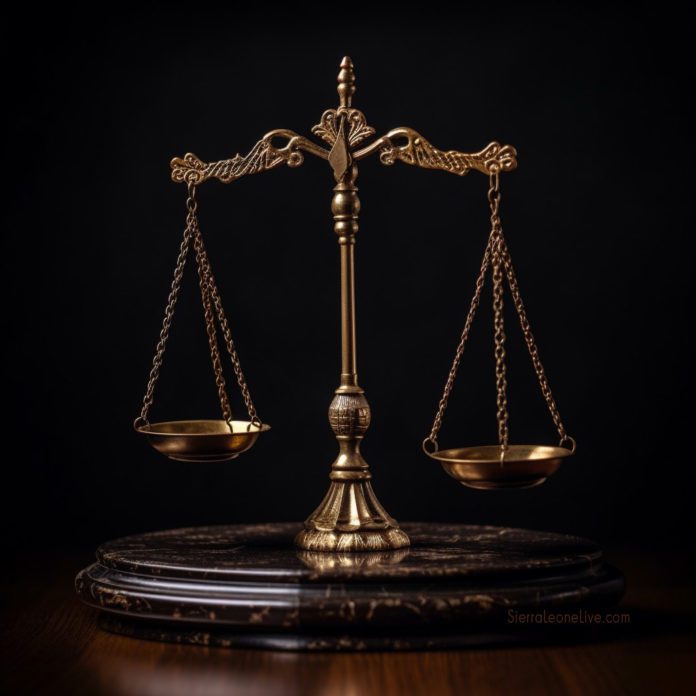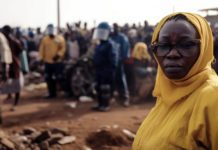
Who will do justice to leadership in Sierra Leone?
By Mahmud Tim Kargbo
Thus, you can see it plain:
Ill guidance is the cause of the ill-fame.
The world has earned, this wicked world of pain.
Bad leadership, not nature, has gone to rot in you.
Dante in The Divine Comedy, Book II, Canto XVI (transl. Clive James)
IN A COUNTRY GROWN CYNICAL about politics, it is easy to forget that the essential purpose of government is justice. And if the leadership of the nation entails that primary responsibility, so too does leadership in the workplace, community, and home. The coincidence of the demise of leadership at every level of society and the flagrant erosion of justice in Sierra Leone at large is a signal reminder of the ancient truth that without justice, there is no leadership.
All the major issues of our day represent violations of justice: dysfunctional democracy, corporate malfeasance, financial crisis, people trafficking, violence, social dysfunction, and middle-class decline. In the workplace, excessive workloads, low wages, insecurity, intimidation, inadequate health and safety measures, disruption, disengagement, disloyalty, distrust, state-planned corruption, and more all reflect the erosion of justice and the failure of leadership.
Inevitably, when honest dialogue is stifled by cynicism, sophistry, and state-protected bootlicking, many people will roll their eyes and ask, “Ah, but what is justice?” Most of them will be unaware that the question has muddled minds since the dawn of civilisation. Yet from the start, while people struggled to define the concept, they all instinctively knew injustice when they saw it, as we all do, in the realities of everyday life in Sierra Leone.
Social-justice Of course, the old disputes over the meaning of justice remain. It’s ironic that hardly anyone today has heard of Thrasymachus, yet many in Sierra Leone will agree with his cynical definition of justice as “nothing but the advantage of the stronger.” Celebrities get away with murder, corporations buy influence and bully employees, politicians are a law unto themselves, and money lets wealthy people do things that would get them into serious trouble if they were poor.
So the ancient controversy endures between those who maintain “might is right”, and those who insist that “right is right”, between the advocates of cynical expediency and those who recognise a moral standard that binds both weak and strong, rich and poor, in Sierra Leone. Tragically, few people today know of Socrates’ defiance of the Sophist’s “might is right” argument or Plato’s classical definition of justice as “suum cuique”, giving to each person what is due to him or her. This dictum explains why injustice involves depriving a person of what belongs to him or her by right. The very essence of justice is a debt that has to be paid.
According to this common-sense understanding, justice amounts to the restoration of the proper order among people in a community or country. It is a dynamic process in which the debts constantly incurred in the undertow and upheavals of everyday life are paid and socio-economic equilibrium is restored. Augustine noted that without justice, the state becomes nothing more than robbery.
Justice presupposes that human beings have certain natural rights that precede the authority of the state. If such rights do not exist, then there would be no justice apart from man-made laws, and there would be no way of judging the actions of governments. And man-made laws gave us Nazi death camps, apartheid, slavery, and other legal monstrosities.
The suum cuique recognises that justice depends on natural law and that bad laws can be adjudged as the perversions that they are.
The claims of classical Natural Law are controversial in the climate of moral relativism today, but they are limited and rational. Natural Law appeals to human reason and maintains that there is common ground on which people, even from different cultures, can develop rational arguments for the just settlement of disputes. Objective moral principles can be known by all people through rational arguments built on premises about human nature and Sierra Leone that do not depend on religious, tribal, or cultural standards.
The first principle of natural law is: seek good and avoid evil; do good to others; injure no one; and give each person their due. Sound philosophy, common sense, and science clearly specify what is good for us and what is bad for us. As rational, relational animals, human beings need meaning, purpose, freedom, knowledge, respect, community, work, and material sufficiency in order to flourish and should not be deprived of them. By precise contrast, meaninglessness, futility, enslavement, ignorance, contempt, isolation, unemployment, and poverty diminish and destroy humanity.
The concept of natural rights is primordial and was recognised as self-evident by classical philosophers and even some modern thinkers like Locke. A natural right is an inalienable possession that belongs to each of us as human beings, flowing from our recognition of the realities of personhood, human dignity, morality and law, and mutual obligations.
However, the defective foundations of modern philosophy promoted the denial of human nature, initially in theory, but ultimately in practice. The 20th century heard Sartre intone, “There is no human nature”, and witnessed totalitarian tyrants behave as if there were no human rights. Inevitably, when one rejects the rational conclusions of natural law, one is left with the cold utilitarian expedient: mold people any way you wish if you have the power. And Ivory tower professors, power-hungry politicians, and callous corporations have been doing precisely that ever since in Sierra Leone.
Justice is the great challenge for leadership in every field in Sierra Leone because the purpose of leadership is human flourishing, which starts with a proper understanding of the meaning and purpose of human life. Beyond the more spectacular violations of justice, the proportions of the crisis are readily discernible in the many injustices perpetrated daily against ordinary people in the workplace and communities.
The near extinction of courtesy and civility reflects the repudiation of basic social obligations by most people today in Sierra Leone. Backstabbing, so common in our country, was once condemned as a violation of justice because it used deceit to deprive another person of work, friends, support, and respect; derision too used to be regarded as an injustice as it shamed another person, undermining their dignity and social standing; Lying and cheating are other serious injustices sniffed at today in Sierra Leone, regardless of the damage they do; the undermining of free speech by political correctness is another insidious violation of justice in our everyday lives; by definition, the self-gratifying promiscuity causing such widespread psychological damage and social dysfunction is injustice in many guises; and the forgotten obligations of respect for parents, teachers, doctors, soldiers, and the police, once models of integrity and people whose selfless service created debts that could never really be paid in full reveals how far short of a truly just society we now fall.
These seemingly minor injustices create the social milieu in which many much greater injustices are perpetrated in Sierra Leone and all too frequently go unchallenged. The failure of leadership at every level of society brought us to this juncture, and only leadership, standing firmly on the principle of justice, can restore the harmony and vibrancy of communal life in Sierra Leone.
Justice is a principle on which all people should stand. Capitalism and socialism are not principles but socio-economic theories that give rise to specific policy commitments, and the same is true of conservatism, liberalism, and libertarianism in the political arena. Capitalists, socialists, and the rest should be flexible in their policies—and we know they are very adaptable when it suits them—but non-negotiable in principles, like justice.
When they treat their theories and the policies that flow from them as principles, refusing to make concessions under the principle of justice, they expose themselves as ideological, automatically imposing restrictions on rational debate. And while they try to define justice in the confused categories of utilitarianism or contractarianism, they generate only the seemingly irreconcilable divisions currently tearing Sierra Leone apart.
In the workplace, a manager who has no interest in the well-being of employees, caring not a whit about financial hardship, long hours that eat into family time, anxiety about job security, and other common workplace woes, plainly does not understand justice and therefore no meaningful commitment to leadership. He merely fuels poor performance in business and the social dysfunction that then swells the tax burden and the size of the government.
Justice is a condition of human flourishing, and it is one of the Cardinal Virtues. The advancement of justice requires first the renewal of the life of virtue in Sierra Leone and, therefore, the reintroduction of the humanities in schools and universities. This remains the only way to inspire informed reflection on the human condition, as manifested in all times and all places in Sierra Leone: by helping the young to know what it means to be human and teaching them to rationally question authority and strive for justice.
The 19th-century British Prime Minister, William Gladstone, observed,
“National injustice is the surest road to national downfall.”
His warning applies equally to people in social positions of trust, community, and business, and at this critical moment in history, everyone should ask this simple question: In my roles as a politician, civil servant, parent, neighbour, business leader, and citizen, am I promoting justice in our society, or am I one misleader?




